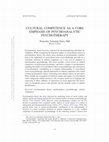Papers by Pratyusha Tummala-narra
sagepub.com/journalsPermissions.nav

Biopsychosocial Approaches to Understanding Health in South Asian Americans
South Asians, or individuals with ancestral roots in India, Pakistan, Bangladesh, Sri Lanka, and ... more South Asians, or individuals with ancestral roots in India, Pakistan, Bangladesh, Sri Lanka, and Nepal, constitute one of the fastest growing groups of Asian immigrants in the United States (Inman and Tummala-Narra 2010; U.S. Census Bureau, Population projections of the United States by age, sex, race and Hispanic Origin: 1992 to 2050, 2010). South Asian immigrants and their children face acculturative stress, and specifically numerous challenges in the U.S., such as feelings of loss, separation, alienation, and anxiety about the new cultural environment, intergenerational stress, problems with English language communication, immigration status, and financial limitations. Stress related to acculturation, trauma, and discrimination has been linked with mental health outcomes (depression, anxiety, substance abuse) among various groups of immigrants in the U.S. This chapter delineates the impact of the immigration and acculturation process on mental health among first (immigrant) and second generation South Asians in the U.S. Additionally, we address barriers to the identification of and access to culturally-informed mental health care.

The Legacy of Racism for Children
Child sex trafficking is a global crisis with devastating consequences physically, psychologicall... more Child sex trafficking is a global crisis with devastating consequences physically, psychologically, and socially. Psychologically, child sex trafficking survivors often face post-traumatic stress disorder, depression, suicidal ideation, and substance dependence, among other consequences. Children and adolescents from marginalized communities face increased risk of sex trafficking due to intergenerational poverty and trauma, discrimination, objectification, low access to helping professionals, and disparities in responsiveness from judicial and health professionals. Cultural oppression is a historical and contemporary reality that shapes the vulnerability to sex trafficking and the lack of adequate, culturally responsive care services for rescue and restorative processes. This chapter, by psychologists with expertise in the cultural context of trauma recovery, provides an overview of sex trafficking, the ways in which cultural oppression intersects with this trauma, and recommendatio...
Sexual boundary violations in psychotherapy: Facing therapist indiscretions, transgressions, and misconduct.
Psychoanalytic Dialogues
This commentary is a response to Dr. Rachael Peltz’s paper (this issue) concerning the experience... more This commentary is a response to Dr. Rachael Peltz’s paper (this issue) concerning the experience of resignation syndrome among refugee children in Sweden, and more broadly extreme traumatic stress endured by refugees globally. Dr. Peltz’s paper raises important questions for psychoanalytic practitioners and scholars concerning our engagement with sociocultural and political trauma and violence directed against children and families. My commentary focuses on three major areas, including the ways in which the bodies of children contain collective traumatic stress and ambivalence toward living and dying, the social disorder of xenophobia and racism that marginalizes and traumatizes the most vulnerable, and psychoanalytic witnessing as a response to state sponsored abuse of children.
Asian American Journal of Psychology

The American journal of orthopsychiatry, 2018
Guided by an integrative contextual framework of immigrant youth development (García Coll & Marks... more Guided by an integrative contextual framework of immigrant youth development (García Coll & Marks, 2012), this study investigated the potential role of developmental (e.g., ethnic identity) and contextual factors (e.g., perceived discrimination, stereotyping) in mental health outcomes and help-seeking attitudes, and variations across gender and nativity among Asian American college students. Online surveys assessing perceived subtle and blatant racism, ethnic identity, the internalization of the model minority stereotype, depressive symptoms, anxiety symptoms, and attitudes toward seeking help from mental health professionals were administered to Asian American college student participants (n = 465) from diverse ethnic backgrounds and geographic regions in the United States. The findings support prior research indicating that perceived subtle racism and blatant racism are positively associated with depressive and anxiety symptoms. Further, only certain dimensions of ethnic identity ...

Psychoanalytic Psychology
While there has been increasing attention directed toward sociocultural issues in psychoanalytic ... more While there has been increasing attention directed toward sociocultural issues in psychoanalytic scholarship and recent efforts to integrate cultural competence as a core emphasis in psychoanalytic theory and practice, there have been no empirical investigations of how cultural competence is conceptualized by psychoanalytic psychologists. The present study aimed to examine how psychoanalytic psychologists approach cultural competence in psychotherapy. Semistructured interviews were conducted with 20 psychologists (10 men and 10 women; 12 White, 4 Latino/a, 2 African American, 1 Asian American, 1 Multiracial) with at least 10 years of experience in providing psychoanalytic psychotherapy with clients from socially and culturally diverse backgrounds. Data was analyzed using conventional content analysis (Hsieh & Shannon, 2005), revealing 4 broad domains and several themes within each of these domains. The 4 broad domains included (a) Complexity of identity and affect, (b) Conscious and unconscious dynamics between therapist and client, (c) Social oppression and traumatic stress, and (d) Therapist's ongoing commitment to self-reflection. The findings support a process-oriented conceptualization of cultural competence. The implications of the findings for research, training, and practice are discussed.
Women & Therapy, 2016
ABSTRACT Human trafficking is maintained within a context of intersecting forms of oppression. Cu... more ABSTRACT Human trafficking is maintained within a context of intersecting forms of oppression. Cultural oppression, including racism and ethnic bias, creates additional risk for human trafficking and generates unique challenges for prevention and intervention. There are, however, cultural strengths that survivors of human trafficking have that may be utilized to aid their recovery process as well as psychotherapeutic interventions. In addition to traditionally recognized legal and economic strategies, ending human trafficking requires engagement in interrupting the factors that increase vulnerability to human trafficking, including racism and ethnic bias. By combating oppression, abolitionists can work to create a society that is committed to ending slavery.

Gendered Journeys: Women, Migration and Feminist Psychology, 2015
Recent events, such as the brutal gang rape and subsequent death of a 23-year-old woman on a bus ... more Recent events, such as the brutal gang rape and subsequent death of a 23-year-old woman on a bus in New Delhi, India in December, 2012, have stirred global public outrage. Yet, violence against women, both physical and sexual, is a major public health problem worldwide, occurring across cultural and socioeconomic contexts (Basile, Chen, Black & Saltzman, 2007; Bryant-Davis, Chung & Tillman, 2009). While the problem of sexual violence is rooted in social injustice in any cultural context, it is further complicated in the case of immigrant women of color who cope with layers of inequality and discrimination within and outside of their ethnic communities. Because of these challenges, traumatic experiences of immigrant women are often unnoticed and unad-dressed within families, communities and broader society. In particular, sexual violence experienced by South Asian women has been virtually unaddressed in the psychological literature, paralleling the lack of discussion and silencing of this issue in South Asian communities.

Journal of Adolescent Research, 2015
Immigrant-origin adolescents in the United States face a number of stressors across different soc... more Immigrant-origin adolescents in the United States face a number of stressors across different social contexts (e.g., home, school), and yet, distress related to these stressors often goes unnoticed and access to resources is limited. This study examined how racial minority immigrant-origin adolescents in an urban setting construct and negotiate experiences of their ethnic and racial group membership, acculturative stress, and approaches to coping with acculturative stress. Guided by an integrative contextual framework of minority youth development, semistructured group interviews were conducted with 64 adolescents (35 girls and 29 boys) at an urban public high school located in the Northeastern part of the United States. Participants were either immigrants or children of immigrants from Afro-Caribbean (e.g., Haitian), Asian, Latino/a, and South Asian backgrounds. Analyses of the group interview data revealed four major domains related to experiences of ethnicity and race: (a) pride ...

Journal of Aggression, Maltreatment & Trauma, 2007
Abstract There is growing recognition among trauma researchers, clinicians, and human rights acti... more Abstract There is growing recognition among trauma researchers, clinicians, and human rights activists of the need for greater understanding of the nature, impact, and mediators of traumatic exposure among trauma survivors from diverse cultures and contexts and a growing interest in the phenomenon of resiliency and the possibility of recovery in the aftermath of traumatic exposure. This introduction briefly describes the articles that comprise this volume, emphasizing their status both as individually unique and worthwhile contributions to this literature and as a collection of works that speak powerfully to the promise of multi-cultural research and practice and to the need for a theoretical framework able to account for wide variations in individual expressions of psychological trauma, trauma recovery, and resilience. For us as co-editors of this volume, that framework resides in the ecological perspective of community psychology and in the attention to culture and context inherent in ecological theory.
Journal of aggression, …, 2007
ABSTRACT
APA PsycNET Our Apologies! - The following features are not available with your current Browser c... more APA PsycNET Our Apologies! - The following features are not available with your current Browser configuration. - alerts user that their session is about to expire - display, print, save, export, and email selected records - get My ...

Psychoanalytic theory has been criticized for decontextualizing individual development. While rec... more Psychoanalytic theory has been criticized for decontextualizing individual development. While recognizing the historical neglect of sociocultural context in psychoanalytic theory, this article raises attention to psychoanalytic contributions to the exploration of sociocultural issues in psychotherapy and calls for a systematic inclusion of cultural competence as a core area of emphasis of psychoanalytic psychotherapy. The article includes a brief review of cultural competence in professional psychology, and both a critique of psychoanalysis regarding the neglect of sociocultural context in psychotherapy and a discussion of psychoanalytic contributions to a complex understanding of sociocultural issues in psychotherapy. Specific approaches to cultural competence that extend existing psychoanalytic theory concerning sociocultural context are presented. These include the recognition of historical trauma and neglect of sociocultural issues, indigenous cultural narratives, role of contex...

Psychoanalytic Dialogues
This commentary is a response to Veronica Csillag’s exploration of the influence of historical an... more This commentary is a response to Veronica Csillag’s exploration of the influence of historical and transgenerational trauma on the lives of immigrants, and on the psychoanalytic process (this issue). Dr. Csillag’s paper deepens our understanding of the intrapsychic life of immigrants who have suffered collective trauma pre-migration and continue to suffer from “ghosts” from the past. Her ideas are critical to examining not only the specific traumas incurred in Europe related to the Nazi Holocaust and totalitarian and socialist regimes but also to contemporary traumas related to social identity and position in the United States. In this commentary, I elaborate three primary areas within Dr. Csillag’s contribution: (a) the illusion of choice in traumatic migration, (b) secrecy and privacy, and (c) experience of the outsider and the insider. My discussion underscores the importance of engaging with historical and ongoing trauma in psychoanalytic psychotherapy as a path to healing within individual and collective dimensions.
Psychoanalytic theory and cultural competence in psychotherapy., 2000
Psychoanalytic theory and cultural competence in psychotherapy., 2000
Psychoanalytic theory and cultural competence in psychotherapy., 2000








Uploads
Papers by Pratyusha Tummala-narra